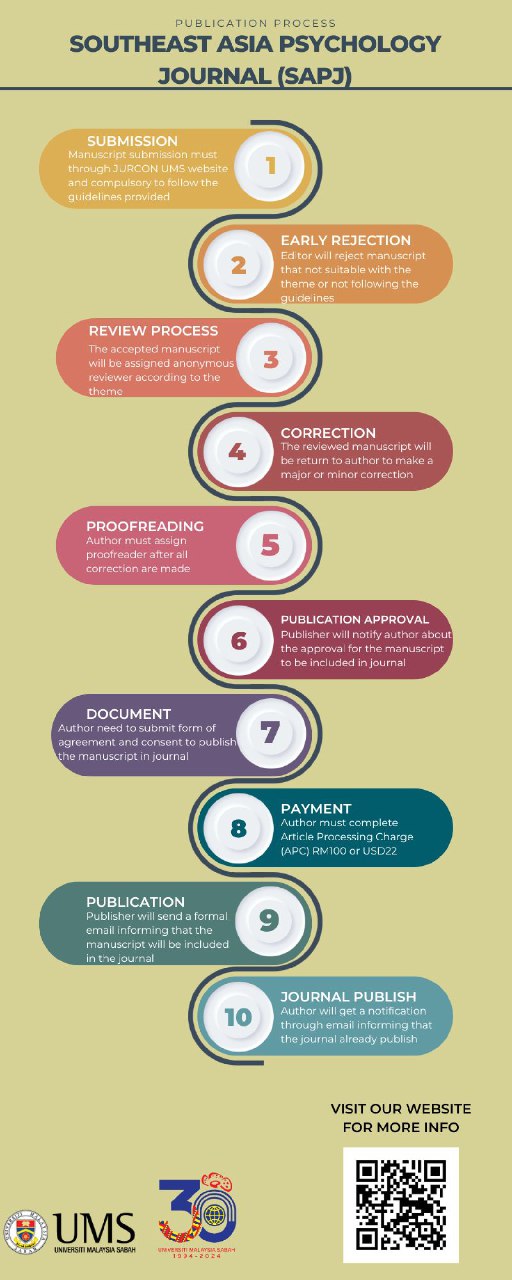Attribution of poverty among Malaysian students in the United Kingdom.
DOI:
https://doi.org/10.51200/sapj.v1i1.5724Keywords:
Malaysian students Causal Attribution Psychology of povertyAbstract
This study investigates Malaysian students’ attribution of poverty and attitudes towards the poor in rural Malaysia. A combined total of 124 Malaysian students in the United Kingdom participated in this web-based survey. Factor analysis results reproduce the tripartite (individualistic, structural and fatalistic) structure for attribution of poverty. The results suggest that there is a statistically significant main effect for gender (F3,120=4.48, p=.005) wherein females have a higher attribution for poverty. On attitudes towards the poor, it was found that with upward social mobility, respondents have a more positive attitude towards the poor. It was recommended that further study should focus on how the poor attribute poverty
References
Abouchedid, K., & Nasser, R. (2001). Poverty attitudes and their determinants in Lebanon’s plural society. Journal of Economic Psychology, 22, 271-282.
Atherton C. R., G. R. J., Haagenstad S., Holt D.J., Jensen L. A., O’Hara, D. F., & Rehner, T. A. (1993). Measuring attitudes toward poverty: A new scale. Social Work Research Abstracts, 29(4), 28-30.
Beck, E. L., Whitley, D. M., & Wolk, J. L. (1999). Legislators’ perceptions about poverty: Views from the Georgia general assembly. Journal of Sociology and Social Welfare, 26(2), 87-104.
Bullock, H. E. (1999). Attributions for poverty: A comparison of middle-class and welfare recipient attitudes. Journal of Applied Social Psychology, 29(10), 2059-2082.
Carr, S. C., & MacLachlan, M. (1998). Actors, observers, and attributions for third world poverty: Contrasting perspectives from Malawi and Australia. Journal of Social Psychology, 138(2), 189-202.
Cozzarelli, C., Tagler, M. J., & Wilkinson, A. V. (2002). Do middle-class students perceive poor women and poor men differently? Sex Roles, 47 (11-12), 519-529.
Cozzarelli, C., Wilkinson, A. V., & Tagler, M. J. (2001). Attitudes toward the poor and attributions for poverty. Journal of Social Issues, 57(2), 207-227.
Feagin, J. (1972). Poverty: We still believe that God helps those who help themselves. Psychology Today, 6, 101-110,129.
Furnham, A. (1986). Economic locus of control. Human Relations, 39(1), 29-43.
Furnham, A., & Gunter, B. (1984). Just world beliefs and attitudes towards the poor. British Journal of Social Psychology, 23, 265-269
Gurin, G., & Gurin, P. (1970). Expectancy theory in the study of poverty. Journal of Social Issues, 26(2), 83-104.
Halik, M. & Webley, P. (2011). Adolescents’ understanding of poverty and the poor in rural Malaysia. Journal of Economic Psychology, 32(2), 231-239.
Hunt, M. O. (1996). The individual, society, or both? A comparison of black, latino, and white beliefs about the causes of poverty [Electronic version]. Social Forces, 75(1), 293-322.
Kluegel, J., & Smith, E. (1986). Beliefs about inequality: Americans’ view of what is and what ought to be. Hawthorne, NY: Aldine de Gruyter.
Lever, J. P. (2005). The subjective dimension of poverty: A psychological perspective [Electronic version]. Paper presented at the International Conference: The many dimensions of poverty, Brazil. Retrieved January 15, 2006, from http://www.undp-povertycentre.org/md-poverty/ papers/ Joaquina.pdf.
MacDonald, A. P. (1971). Correlates of the ethics of personal conscience and the ethics of social responsibility. Journal of Consulting and Clinical Psychology 37(3), 443.
Morcol, G. (1997). Lay explanations for poverty in Turkey and their determinants. Journal of Social Psychology, 137(6), 728-738.








